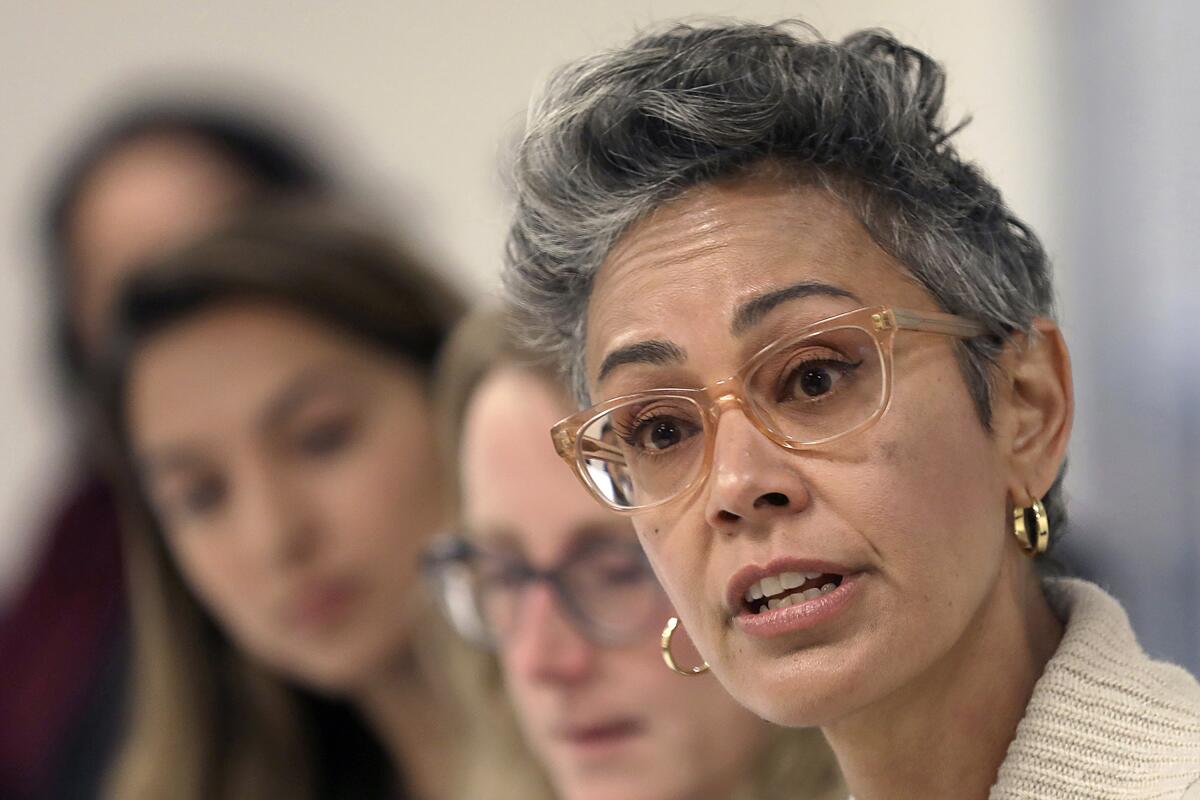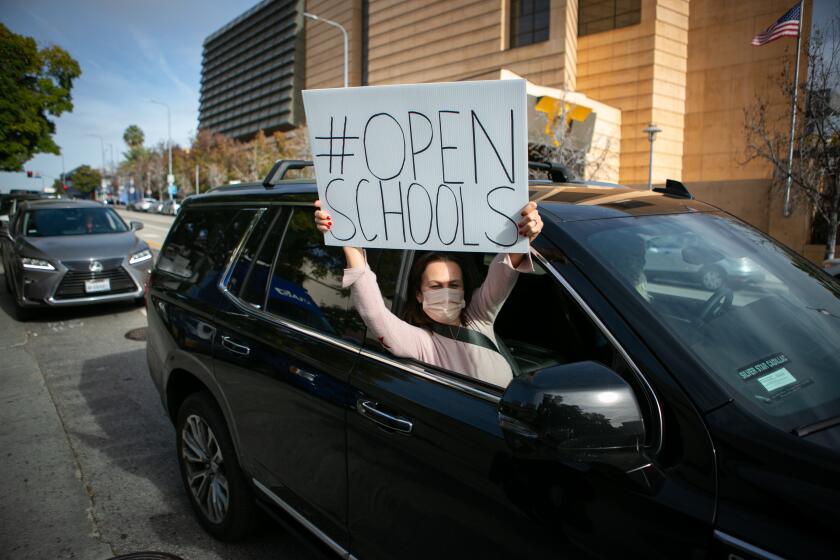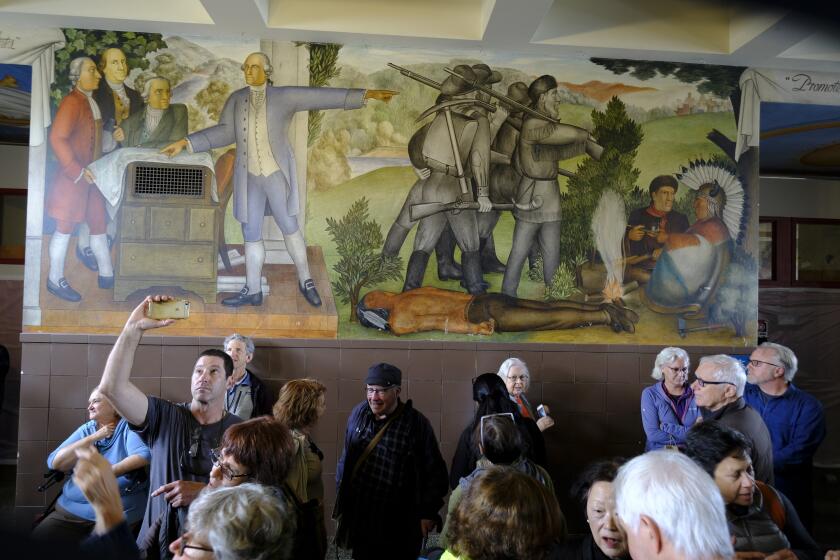Commentary: San Francisco school board members ignored parents and students. So they were ousted

- Share via
Like most people who leave the city they grew up in and build a life somewhere else, I did not pay much attention to my hometown school board — until the barrage of bad decisions out of San Francisco became so extreme that I couldn’t turn away.
Voters there clearly felt the same. In a landslide Tuesday, they threw three San Francisco Unified school board members out of office in the city’s first recall election in nearly 40 years.
It was one in a wave of school board recalls that have taken place across the country during the pandemic, as parents everywhere deal with the frustrations of school closures, masking requirements and what feels like never-ending uncertainty. But every election is unique, and I don’t think this one is simply a backlash against COVID-19 or a repudiation of progressive politics. It shows what’s possible in a city where residents are hyper-politically active and elected officials demonstrate extreme ineptitude — ignoring the pleas of their constituents over and over again.
Most of the 22 recall campaigns against California school boards this year were triggered by slow school reopenings. But the schools have reopened and revenge recalls accomplish very little.
First came the school board’s move in January 2021 to rename 44 schools based on an embarrassing dearth of research. The goal was to advance equity by removing names of historical figures linked to slavery and colonialism. But instead of consulting scholars, the school board backed recommendations made by a committee whose research sources included Wikipedia, the History Channel website and erroneous interpretations of local news sites. The committee got important facts wrong about some of the people whose names it wanted to wipe from the schools — “embarrassing, avoidable, and credibility-destroying errors,” local columnist Joe Eskenazi wrote at the time.
“This is what you get when you perfunctorily cut-and-paste material from sources that would not be acceptable for a junior high school oral report, and then misstate and misinterpret even that paltry material,” he wrote.
The board also wanted to rename schools honoring Abraham Lincoln, who ended slavery, and U.S. Sen. Dianne Feinstein, who was the first woman to become mayor of San Francisco and the first woman elected senator of California. Why Feinstein? Because when she was mayor in the 1980s, the city replaced a vandalized Confederate flag in front of City Hall — though she eventually replaced it with a Union flag. Many people spoke out against renaming Feinstein Elementary, the San Francisco Chronicle reported. Nevertheless, the board decided it would get a new name.
A day after reading about the renaming debacle, I came across a video clip in which a student from my high school spoke during a late-night school board meeting about the difficulty of learning on Zoom. On the verge of tears, she begged for clarity about whether students would be able to return to campus.
“For lack of a better word at this hour of the night, you need to cut the crap and just tell us,” the student said. “Give us a little bit more help.”
San Francisco schools have been suffering one embarrassment after another. The school board has shown it is not up to the task of putting education ahead of internal squabbles.
Schools had been closed for 10 months at that point. Instead of planning for reopening, the board turned its attention to a wildly controversial proposal to change the admissions criteria for the city’s renowned public high school.
Lowell High School historically has admitted only students with strong grades and test scores, a policy that’s been controversial since before I was a student there in the 1990s. Though the campus has been an engine of upward mobility for generations of students from immigrant families, Black and Latino students have long been underrepresented. Overrepresented are the number of California politicians with ties to the school: Both parents of former Gov. Jerry Brown graduated from Lowell High, as did Gov. Gavin Newsom’s mother. State Controller Betty Yee graduated from Lowell in 1975, and Lt. Gov. Eleni Kounalakis is married to a Lowell alum, according to my alumni newsletter, which writes about such things.
The board fast-tracked its move to replace Lowell’s selective admissions with a lottery system, sparking anger from parents who were struggling to understand why the school board was making so many changes while schools were still closed because of the pandemic (even though San Francisco’s COVID-19 infection rate has been among the lowest in the nation).
“I don’t know what the San Francisco public school board is doing,” a parent told the San Francisco Chronicle. “I’ve lost trust in them. Are children the priority? I just don’t feel it’s a priority to them.”
There were other problems too: a school board member’s racist tweets, a massive budget deficit, and lawsuits flying every which way, with the mayor suing the school district to try to compel campuses to reopen and a board member suing her colleagues for demoting her over the tweets.
In the end, all that misdirected effort accomplished little. A judge ruled that the board couldn’t change the Lowell admissions policy because it had violated open-meeting laws. The board rescinded its plan to rename dozens of campuses after being ridiculed at home and across the nation.
But the parents who spent hours on Zoom trying to get the board to listen to them and their children had been awakened. Their recall movement plowed ahead, gaining support from progressives and moderates in a city where Dem-on-Dem combat is usually fierce. This wasn’t about a conservative backlash. It was just about a school board that didn’t do its job.
More to Read
A cure for the common opinion
Get thought-provoking perspectives with our weekly newsletter.
You may occasionally receive promotional content from the Los Angeles Times.













